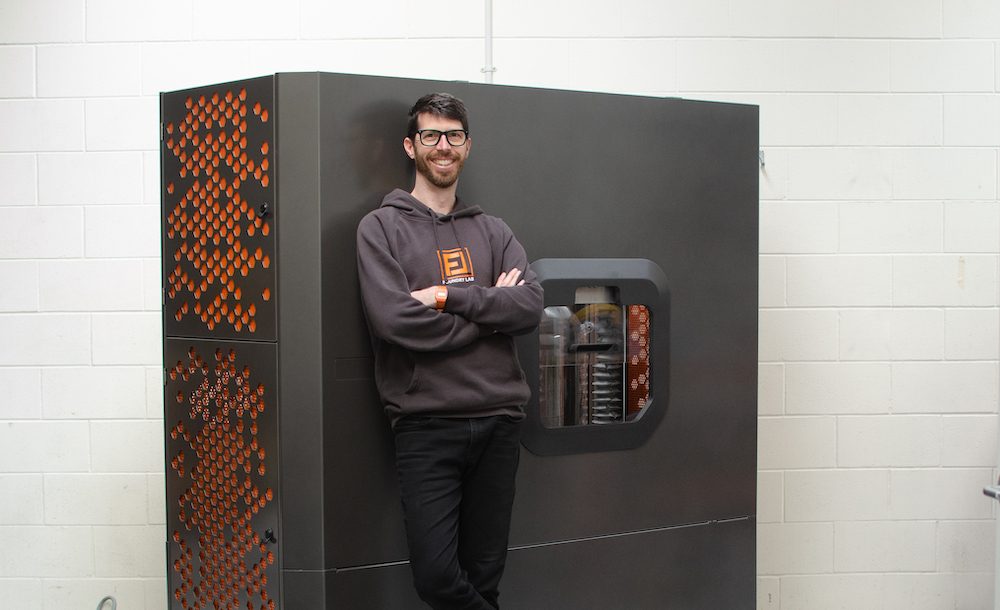Remember Easy Bake Ovens? You’d mix up some colored powder and water until a dough or batter formed, put it in a mold, pop it in the oven and before you knew it – ding! A disgusting treat. Foundry Lab, a New Zealand-based startup with backing from Rocket Lab’s Peter Beck, has figured out how to do something similar, except instead of chemicals and an “oven,” it’s metals and a microwave.
The company, which emerged from stealth on Monday with an $8 million Series A raise, is using “literally a microwave, but on steroids” to cast metal parts much quicker than metal 3D printing, according to David Moodie, founder and CEO of Foundry.
“It’s super easy for the user; they literally take the mold, throw in the cold metal powder or metal ingots, put it in the microwave, press the button and walk away,” Moodie told TechCrunch. “It even dings when it’s done. As easy as heating up a microwave dinner.”
(Foundry’s microwave has also been used to cook a typical New Zealand meat pie. It took only a few seconds and didn’t taste fantastic, according to Moodie.)
Typical casting systems like investment casting, 3D printing and die-casting take anywhere from one to six weeks to produce. Foundry says it has been able to turn around brake shoes for cars in under eight hours using molds that had been 3D printed using computer-aided design (CAD) molds and a giant microwave. The startup is currently working with zinc and aluminum, but has done some successful stainless steel trials and wants to move onto other metals like copper and brass in the future.
While Foundry’s tech has future applications in manufacturing industries where metal 3D printing can’t reach, the near-term goal is to help car manufacturing R&D teams develop production-identical, functional metal parts that can be used for testing and prototyping before committing to mass production.
“One of the companies we’re talking to is making up to 600 prototype cars before one reaches the market, so they’ll keep changing and keep iterating on it, and that can get expensive really quickly,” Moodie said, adding that tooling costs could be upwards of $50,000 to $100,000.
Moodie says before starting Foundry, he ran an industrial design consultancy business, designing products for mass manufacture. He felt frustrated that testing authorities would consistently reject applications because they were made with parts produced by 3D printers or CNC machines, and therefore, potentially made with the wrong physical structures.
“So I did the Kiwi thing and went to the shed and lucked my way into a system that worked,” he said, noting that much of his experimenting was done using standard microwaves during New Zealand’s latest lockdown, during which time Moodie couldn’t get into his workshop. “What we’re trying to solve is actual castings, trying to simulate a die casting but doing it fast and cheaply. If you machine to a tool to do a die casting, it’s typically three to six months to get that back.”
It’s still early days for Foundry. The company only has a couple of its very large microwaves out for trial with potential customers at the moment, but it will use the Series A funding – which was led by Australian-founded VC Blackbird alongside GD1, Icehouse, K1W1, Founders Fund, Promus and WNT Ventures – to get production-ready by the end of 2023.
Part of the funding will go toward hiring more staff. The company has grown quickly over the past few months, up from six staffers when it first started fundraising to 17 full-time employees now. The goal is to make it to around 35 over the coming months, a task that’s been difficult with New Zealand’s strict pandemic-related border closures.
“The whole border close thing is starting to hit us now,” said Moodie. “The country’s got two microwave experts, and they both have jobs. That’s been particularly difficult. So we’re trying to get someone to come across and help us.”
New Zealand is beginning to open up internally, with Auckland coming out of lockdown this week and the city borders opening up to the rest of the country in mid-December. Unless the new omicron variant holds things up, the country is expected to start inviting vaccinated travelers back starting April 30, 2022, giving Foundry and other New Zealand startups the chance to hire talent from abroad.
Even though Foundry is working out of New Zealand, it’s targeting markets in the United States and Europe. The company’s long game is to continue to work on the microwaves and get them to a point where they can produce the quantities needed for mass production.































Comment